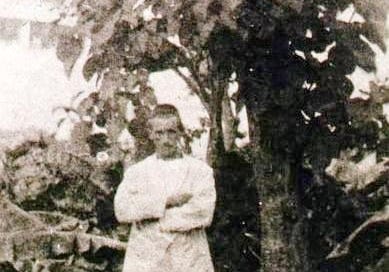It's surprising to find yourself, or something you've written, as a source for part of a famous dead poet’s biography. Especially a famous dead poet with an exotic, volcanic life. I’m speaking of Arthur Rimbaud (1854-1891).
I wrote an essay for a magazine about Rimbaud's time late in his short life as a coffee trader in Ethiopia, about how he got there, unlikely as that was. I was thinking about writing something else about Rimbaud recently, so I promptly went to everyone’s convenient source of choice, Wikipedia. Lo and behold, there it is, citation number 72, a reference to the article I'd written twenty-one years ago and nearly forgotten.
It made me think of how strange it is the places we end up in our lives. Here was this enfant terrible, possessed of extraordinary poetic powers, who ended up in Harar, in what is now eastern Ethiopia, having abandoned poetry forever some fifteen years earlier, counting his money, forever concerned that local merchants were cheating him out of a few pennies, or whatever currency they used.
But that’s not the way it began.
He sprang full blown as a poet from a small city in northern France. He was writing lasting poems by the age of sixteen. Arthur Rimbaud was a poet whose life was like one of those Roman candles that goes astray and sweeps erratically across the sky with the possibility of crashing into a house or a person or you. Everything about his life was dramatic, self-destructive and extreme.
He wrote incendiary, sometimes gorgeous, sometimes fearlessly sexual, sometimes frustratingly complex, and, at times, incomprehensible poetry in the remarkably brief period he wrote poetry. Which is to say, from the age of sixteen to the age of nineteen or twenty. His most famous poems are "The Drunken Boat" and "A Season in Hell." I prefer poems like his early, exquisite, “Au Cabaret Vert,” “The Seekers of Lice” and one of the boldest depictions of early sexuality, “Memories of the Simple-Minded Old Man.”
Nothing had ever been seen like this in French poetry before, even from Baudelaire. After the age of twenty or so, Rimbaud stopped writing altogether. No one knows why. The rest of his life, he was a wanderer. He went in search of something he could never find, because it wasn't there. He looked for it in Paris, in Indonesia, in London, in Cyprus, in Yemen. And, finally, in Ethiopia.
One of his last efforts was “Illuminations,” forty-odd prose poems it seems he wrote mostly when he was in England. No one understands them. Some people claim they do. Read a few, and see for yourself.
Some artists love Rimbaud because his chaotic, fiery life gives them validation for their own self-generated chaos. I am sometimes a passenger on that ship. And Rimbaud's life was as chaotic as any self-destructive American artist's has been, if not more so. Typical is the affair he had with the (married) poet Paul Verlaine that ended with Verlaine, in a rage, shooting Rimbaud in the wrist. As Allen Ginsberg said, "Rimbaud seems to be a complete turn-on catalyst to every poet in small town isolated, or big megapolis, staring at the city lights over the roof." What that means to me is: don't let those small-town minds stop you from becoming the comet that you are. So you destroy a few things, or lives, along the way. You're an artist. Yes, an artist! A pass for crashing through life! But, really, Rimbaud harmed himself more than anyone else. Verlaine, after all, was responsible for his own life and marriage.
The last years of his life Rimbaud spent exporting coffee from Ethiopia—an astonishingly able linguist, he learned the two languages spoken there, Amharic and Harari, quickly—and smuggling guns. All he cared about was money. He took up photography. In those later years, someone realized who he was (Rimbaud had become famous in Paris without knowing it) and asked him about his poetry. "Disgusting!" Rimbaud replied.
One of his last letters, written to his sister from a hospital in Marseille, where he was soon to die at the age of thirty-seven, says, "Our life is a misery, an endless misery. Why do we exist?"







Wow! What a fascinating story - I had no idea!
In high school, I read "Axel and Rimbaud." Trying to remember why and what it was. And who wrote it. Maybe Edmund Wilson or Mary McCarthy.